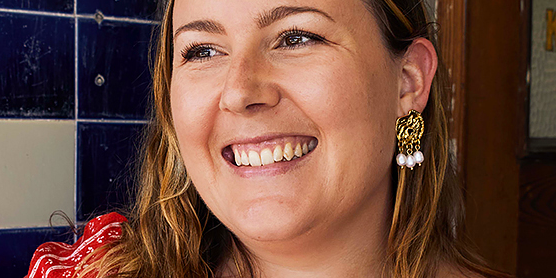In this guest blog, Qualified Naturopath Jessie-Anne El-Tannoury (she/her), one of Comfortable In My Skin's Recommended Providers, shares all you need to know about PCOS (Polycystic Ovary Syndrome).
The common experience of PCOS…
Being told you have PCOS can often feel confusing, with many unanswered questions and a sense of limited options. It often can feel like you’ve been told you have a condition and this is just how it will be for the rest of your life. This can make you feel like your body is working against you, but the messages our body sends us are incredibly important, and we need to listen.
But here’s the truth: PCOS does not have to be a life-long sentence. With the right support and education, it is possible for your body to balance.
So what is PCOS?
Polycystic Ovary Syndrome is a common hormonal condition that affects up to 20% of AFAB individuals of reproductive age in Australia. Everyone’s experience may be different, but you could experience:
-
Irregular or absent periods, due to a lack of ovulation
-
Higher levels of androgens, leading to acne, unwanted hair growth, or hair thinning.
-
Polycystic ovaries, meaning your ovaries may have small fluid-filled follicles due to anovulation
-
Metabolic challenges, such as insulin resistance, difficulty losing weight, or increased risk of diabetes.
Why Does PCOS Happen?
PCOS doesn’t have one single cause. There are various influences that may contribute to its development, which may include a mix of genetics, environment, and lifestyle.
Your body is always seeking balance, and when PCOS develops, it’s often due to underlying disruptions in key systems:
-
Insulin Resistance - When your body struggles to process insulin properly, it produces extra. This excess insulin tells your ovaries to make more testosterone, which can interfere with ovulation and contribute to symptoms like acne and excess hair growth.
-
High Androgens - Androgens like testosterone are naturally present, but in PCOS, they can be elevated, causing acne, excess hair growth and irregular cycles.
-
Inflammation - Chronic, low-grade inflammation is common in PCOS, contributing to hormone imbalances and metabolic issues.
-
Genetics - Familial history of PCOS or symptoms like irregular cycles, metabolic concerns, or fertility challenges, may indicate a genetic component.
-
Post-pill PCOS - This is not a verified medical diagnosis as it is not a ‘cause’ of true PCOS. Menstrual cycle irregularity after stopping the oral contraceptive pill is common. A lack of ovulation during OCP use, combined with the time it takes for your menstrual cycle to regulate, may contribute to a high follicle count as seen on ultrasound.
If you have been told you have PCOS based on ultrasound alone, it is important to seek full investigation for diagnosis. Diagnosis requires meeting 2 out of 3 criteria:
1) clinical or biochemical evidence of hyperandrogenism (high testosterone)
2) lack of ovulation; irregular or absent periods
3) polycystic ovaries indicated by ultrasound (high follicle count of >20 in total) or elevated anti-Mullerian hormone (AMH).
If you have been told your testosterone, insulin and bloods are fine, this does not discredit your experience, but it highlights the need for proper investigation to take place to identify the cause of your symptoms. Other conditions exist that may contribute to irregularity or lack of menstrual bleeding.
What can I do to support my PCOS?
Holistic support of PCOS involves identifying what your driving root cause is, and providing evidence-based treatment to rebalance the hormones. One of the main goals in PCOS is to prioritise getting the body to regularly ovulate again, as this is a critical part of maintaining balanced, healthy hormones.
All of the recommendations below are general only, and it is advised to consult with your health professional to choose what is best for you.
1. Nourish Your Body and Blood Sugar Balance
-
Eat wholefoods rich in protein, fiber, and healthy fats.
-
Support blood sugar balance by always pairing sweets (sugar) with protein, and enjoying a 10+minute walk after eating.
-
Welcome insulin-supporting nutrients like cinnamon to a meal. Try adding 1 teaspoon to your morning oats.
2. Support Ovulation & Hormonal Harmony
-
Prioritise daily intake of healthy fats (avocados, nuts, seeds, fish oil) to fuel hormone production.
-
Get enough vitamin D, as deficiency is linked to cycle irregularities and hormonal imbalances.
-
Evidence-based herbal remedies and nutrients are available to promote ovulation and lower androgens (testosterone), based on your needs
3. Soothe Inflammation & Support Gut Health
-
Welcome anti-inflammatory foods into your daily meals, like leafy greens, turmeric, and omega-3s (salmon, sardines).
-
Minimise or avoid inflammatory triggers like excessive alcohol, processed foods, dairy and stress.
4. Calm Your Nervous System & Reduce Stress
-
Engage in nervous system-supporting practices like deep breathing, yoga, or movement to lower stress hormones (like cortisol) that contribute to hormonal imbalances.
-
Discover movement that you actually enjoy doing and aim to do it weekly. This could be dancing, cycling or bushwalks for mind-body support.
5. Address Androgen-Related Symptoms with Natural Support
Your Body is Not Working Against You
PCOS can feel frustrating, but it does not have to be a life sentence. By listening to what your body needs and making small, supportive changes, you can create an environment where healing and balance are possible. And most importantly, you are not alone on this journey.
Jessie-Anne El-Tannoury (she/her) is a Qualified Naturopath based in Sydney, Australia. Jessie is passionate about providing holistic support for hormones, vaginal health, and sexual wellbeing, particularly for those living with herpes, offering compassionate, evidence-based care in a safe and inclusive space. Book with her here. 




